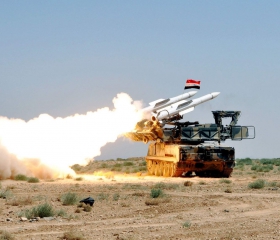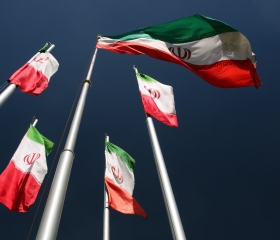Will history repeat itself? In 1956, amidst the Suez Crisis, the USSR produced a diplomatic stunt when it managed to take the attention of the West off the dispersal of rallies in Budapest by the Red Army. Sixty years later, the growing Russian presence in Syria is taking place against the backdrop of the strengthening of the Ukrainian front, which enables President Vladimir Putin to put the decisiveness of Western powers to the test while giving Russia a free hand in Donbass.
Will history repeat itself? In 1956, amidst the Suez Crisis, the USSR produced a diplomatic stunt when it managed to take the attention of the West off the dispersal of rallies in Budapest by the Red Army. Sixty years later, the growing Russian presence in Syria is taking place against the backdrop of the strengthening of the Ukrainian front, which enables President Vladimir Putin to put the decisiveness of Western powers to the test while giving Russia a free hand in Donbass. The analogy with the year 1956 lies in the fact that France’s and the UK’s inconsistent policies on the Syrian conflict led to a weakening of their positions, despite the strengthening of their status during the Libyan campaign of 2011. However, unlike the times of the Suez Crisis, when the diplomatic vacuum resulting from the tripartite intervention was filled by the United States; the Obama administration, which partially built its foreign policy on the cessation of its involvement in the Middle Eastern conflict, has no plans to engage serious military assets to resolve the Syrian issue. However, international relations hate vacuum — besides, it is hard to imagine how Russia will be playing the role of a policeman in the region, where it can hardly comprehend the multiplicity of the current local socioeconomic and political processes, let alone the fact that Moscow's political and military establishment is still suffering from the “Afghan syndrome.”
From Moscow’s perspective, there is more to its involvement in the Syrian case than mere support for its cornered ally. Five conclusions associated with Russia’s foreign and domestic policies, as well as its global and regional position, can be drawn from the country’s active position.
The first thing that comes to mind is the seemingly innocent remark: the Syrian issue is not and has never been a simple one for Moscow. Historically, the bilateral relationship has never been serene: Hafez al-Assad, the father of the incumbent Syrian president, used to cite his dependent position and pursued his own regional policy, which puzzled Moscow. Israel was the one that played the card of those bilateral relations, seeking to prevent supplies of state-of-the-art offensive arms from Moscow to Damascus. As long as it maintains the seller-buyer relationship with Syria, Russia is running a risk of compromising its contacts with Israel and the West. Nevertheless, the Russia–Syria collaboration has been developing for several decades drawing on tested institutional channels, which make the Kremlin totally dependent on the ties established exclusively with the administration of the current regime. Sergey Lavrov has recently shared with Lakhdar Brahimi, the former UN Special Envoy to Syria, that Russia had the same kind of influence on Syria than the United States had on Israel.
Second, jihadists’ progress in Syria and Iraq directly affects Russia’s interests — according to some estimates, some 2,200 nationals of that country are currently fighting for IS and the al-Nusra Front. IS needs recruits from the former Soviet Union very badly — they are tempered in battle and relatively independent of local groups and interests. Anyway, there are lots of Chechens in the IS military command. In the future, there is a risk of further interpenetration of Syrian–Iraqi and Caucasian groups, at last for three reasons. First, over the past 12 months, many Caucasian jihadists joined IS. They prefer fighting for the “caliphate” and getting back to Russia with honors to being soldiers of the Caucasus Emirate, whose high command has been eliminated several times since 2014, and whose “ideological” orientation, which was formed on the basis of its competition with IS, undermines its effectiveness. Since last June, the Caucasus has been considered IS’s vilayat, which indicates its wish to infiltrate that territory. Furthermore, a large-scale campaign is currently underway in the former Soviet Union to promulgate IS. The pages of the Russian-language Dabiq magazine contain numerous appeals for its readers to go to Syria and Iraq, whereas Russian social networks are used to disseminate information “for the sake of the common cause” (news from the frontline, links to sermons, and fundraising announcements). Finally, the increase in Russia’s military presence in Syria can only contribute to the fomentation of Caucasian jihadism in that area, and if IS captures Russian soldiers, it will naturally use this information in its media war.
Nevertheless, the number of soldiers deployed in Syria justifies the implementation of one of Russia’s diplomatic strategies in the Middle East — the development of relationships based upon mutual security concerns with both Arab republics (Syria, Egypt, and Yemen) and the Sunni monarchies of the Persian Gulf and Israel, which is trying to make up for its losses caused by the procrastination of U.S. politicians. Therefore, it is for a good reason that Chechen President Ramzan Kadyrov has been making regular trips to Levant and the Persian Gulf (over the last 12 months, he had several meetings with King Abdullah II of Jordan) seeking closer cooperation in combat against terrorism, while Russian paratroopers are getting ready to take part in the counter-terrorist exercise, which is scheduled to be held in Egypt this autumn. When it comes to Russia’s domestic policy, the threat of IS’s infiltrating its territory enables the Kremlin to maintain nationalist moods and convince the West that Russia is its natural ally in its combat against Islamic terrorism.
Third, Russia’s growing presence can only be analyzed within the context of the game that is played by Iran, another major participant in the Syrian conflict. The agreement on its nuclear program paved the way for Iran to reunite with the international community, and Russia will certainly be doing its best to stop the United States and Iran from making any arrangements on the Syrian issue capable of de facto ousting it from the Middle East. The trilateral relations with Damascus and Teheran do not always prove beneficial for Russia. Unlike Russia, which relies exclusively on contacts with official Syrian institutions, Iran is preparing for al-Assad’s abdication, focusing on the upper class, which was formed amid the chaos that followed the events of 2011. Offering its direct support for the National Defence Forces, which are armed and coordinated by Hezbollah, Teheran is building a framework to develop Syria’s future security institutes exclusively around its own interests. Therefore, military intervention allows Russia to change the alignment of forces of the supporters of the current regime in its favor.
Fourth, Russia’s expanding its military presence in Syria is inseparably associated with the Russia–US relationship. The escalation observed today may be concocted in order to create a sense of need for emergency measures, which could play into the hands of the Kremlin now amid the reluctance of the United States to use force, and division of Europe on the issue of refugees. Vladimir Putin, a realist, has set himself the aim to achieve a polarization of interests in the Middle East according to his own interpretation of international relations. Unlike the Cold War times, the borderline does not run between states separated by ideological controversies, and not between Israel and the Arab world. Moscow believes the world is split into two parts — the West, supposedly in decay and incapable of exporting its political model, and countries that reject any interference from the West, specifically, under the guise of “responsibility to protect” (R2P) and liberal values that underpin this approach. What is Russia trying to get? It wishes to announce the end of the age of “regime change” and make it clear that it can be trusted, unlike other international players in the region. Russian rulers are obsessed with the idea of achieving parity with the U.S. and seek exclusive dialogue with Washington to address issues associated with the resolution of regional conflicts. Peace in the Middle East without Russia’s influence will rid the superpower of some of its weight. Therefore, while striving for a relaxation of tensions in the region, Moscow, nevertheless, contributes to maintaining these tensions by responding to demands by Middle Eastern nations, especially those concerning their military power. The situation in Syria is an excellent example of this approach.
Finally, in the military context, Russia’s interference in Syria’s affairs is a response to the challenge that not a single western nation is capable of addressing promptly. Russia has fresh forces —albeit limited in naval aviation —, expertise in jihadists’ fighting methods, and the defense agreement with the Syrian government, which legitimizes Russia’s interference from the point of view of international law. The times when Russia’s support was limited to a single 300-strong engineering battalion like it happened in Lebanon in 2006 are long gone. Russia’s strategy envisages primarily the reinstatement of the Alawite shrine, with its border running on the shore from Latakia to Tartous and then turning eastward in the direction of Damascus–Homs. Having won the diplomatic war, which must be followed by military victories, Vladimir Putin will obviously make good use of it in the international scene. However, such a victory will also indicate a sharp change in Russia’s policy in the Arab world, which Moscow has constantly sought to base on the denial of any colonization or direct military interference there.
“Of all countries that are dividing Europe and the entire world now, Russia is the only one that Syria should fear and rely on,” French monk Jules Pargoire wrote in the early 20th century. Strange as it may seem, his words remain relevant, but the vision of Russia as a superpower that “always marches ahead” should not obscure the understanding of the limits of its progress.






